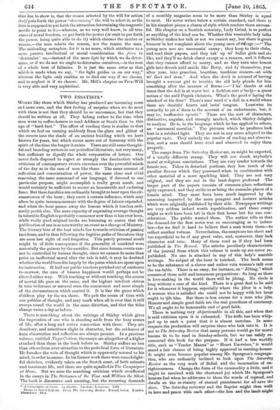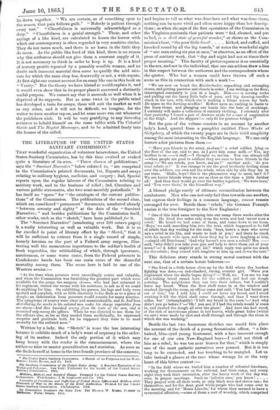TWO ESSAYISTS.v
WORKS like those which Shirley has produced are becoming more and more rare, and the first feeling of surprise when we do meet with them is not that they should be so uncommon, but that they should be written at all. They belong rather to the time when men went to coffee-houses to read Addison or Steele than to this age of "hard fact." The effect of reading them is similar to that which we feel on turning suddenly from the glare and glitter of the streets into the shade of an ancient building which we have known for years, but which seems more out of harmony with the spirit of the time the longer it exists. There are still some thought- ful and brooding writers in our periodical literature; not verymany, but sufficient to dignify the whole corporation of letters. One never feels disposed to regret so strongly the fascination which criticism of contemporary events exercises over the powerful minds of the day as in the case of men like these. The same amount of reflection and concentration of power, the same close and vivid reasoning, the same command of our language, if devoted to one particular purpose, might accomplish a really great result, and would certainly be sufficient to secure an honourable and enduring fame. But these faculties are ordinarily brought to bear upon the cir- cumstances of the hour ; they exert a certain influence, which may often be quite incommensurate with the degree of labour expended, and when the hour passes away the lessons which it teaches nrdi- narily perish also. The mere capacity of expressing average thought in tolerable English is probably commoner now than it has ever been, while really good original books are becoming so scarce that the publication of one is as noteworthy an event as a change of Ministry. The literary bias of the best minds lies towards criticism of passing incidents, and in thus following the fugitive paths of literature they are soon lost sight of and forgotten. This purely personal result might be of little consequence if the generality of mankind were materially the gainers by the sacrifice. But since human events can- not be controlled by human thought, since we cannot do more than point an ineffectual moral after the tale is told, it may be doubted whether the world benefits largely by the pains which are spent upon its instruction. If half our public teachers perished out of existence to-morrow, the sum of human happiness would perhaps not be altered either way. With teaching or without teaching, the course of mortal life goes on the same, and the highest intellect strives in vain to foresee or unravel even the commonest and most simple of the circumstances which control it. It is like the game which children play by the sea shore. We pelt the ocean of time with our pebbles of thought, and may mark when all is over that it still sweeps round the world in the same direction, and that the tides change twice a day as before.
There is something about the writings of Shirley which gives the impression of one who is standing aside from the busy scenes of life, after a long and active connection with them. They are desultory, and sometimes slight in character, but the evidences of keen observation and reflection are always present. In a previous volume, entitled Nugm Criticm, the essays are altogether of a higher standard than those in the book before us. Shirley suffers no less than others from over-attention to the periodical form of literature. He forsakes the vein of thought which is apparently natural to his mind, in order to amuse. In his former work there were somede,light- ful sketches, evidently taken on the Scotch coast, of both animate and-inanimate life, and these are quite equalled in The Campaigner at Home. But we miss the searching criticism which overflowed in the essays in The Statesmen of the Time and William the Silent. The book is discursive and amusing, but the recurring demands
• A Campaigner at Home- isy Londou: L-mgm4.1. 1865.
Ramps on Soci,,ISskieds. From The Saturday Review. Second Series. London Blackwool 1865.
of a monthly magazine seem to be more than Shirley is equal to meet. He never writes below a certain standard, and there is in his simplest pieces a charm of style which renders them success- ful. His chapter on a Scottish notoriety, Lady Grisel, is as perfect as anything of the kind can be. Whether this venerable lady talks as Shirley makes her talk or not we cannot say, but there is great humour in her complaint about the young men of tlk age :—" The young men noo are uncommin' canny ; they keep to their clubs, and read their papers, and they tak' up wV ballet girls and sic like, aud they'll no drink claret except at a ransom, and it follows that they cannot afford to marry, and so they turn nice honest girls into dreech auld maids like Betty, and fa' themselves, year after year, into graceless, heartless, toothless sinners—at odds wi' God and man." And when the devil is accused of having brought a servant girl to trouble, the old lady pleads for him something after the manner of Burns :—" I ha' thocht at odd times that the deil is at warst but a feckless sort o' body—a queer notion o' the auld Popish idolaters. What's the good o' laying the mischeef at his door? There's sma' need o' a deli in a world where there are deceitfu' hearts and leein' tongues. Leastwise its cowardly to pit a' doou to the account o' an unfortunate, but, it may be, inoffensive speerit." These are the sort of characters, distinctive, angular, and strongly marked, which Shirley delights to analyze. He is, in the language which he has applied to others, an "autumnal moralist." The pictures which he produces look best in a subdued light. They are not in any sense adapted to the popular taste. They embody the results of reading and observa- tion, and a man should have read and observed to enjoy them properly.
The essays from The Saturday Review are, as might be expected, of a totally different stamp. They will not shock anybody's moral or religious convictions. They are very tender towards the female sex. Taken in detached portions, they lose much of the peculiar flavour which they possessed when in combination with other material of a more sparkling kind. They are not very original, and they are not in the least degree profound. -The larger part of the papers consists of common-place reflections aptly expressed, and they strike us as being the commOn-places of a female mind. They must have been much improved by the seasoning imparted by the more pungent and incisive articles which were originally published by their side. Newspaper writings are very seldom indeed worth republication, and these essays might as well have been left in their first home but for one con- sideration. The public wanted them. The author tells us that the demand for the first series was so encouraging as to induce her—for we find it hard to believe that a man wrote them—to collect another volume. Nevertheless, the essays are too short and too superficial to be of any great value, and, moreover, they lack character and tone. Many of them read as if they had been published in The Record. The articles peculiarly characteristic of the journal from which this volume is made up are never re- published. No one is attacked in any of this lady's amiable writings. No subject of the hour is touched. The book seems to be the substance of a clever and rather vain woman's talk over the tea-table. There is an essay, for instance, on "Jilting," which consists of these mild and innocuous propositions : So long as there is love-making in the world there will be jilting. No circle is long without a case of the kind. There is a great deal to be said for it whenever it happens, especially where the jilter is a lady. A woman who is satisfied she could not be happy with her lover ought to jilt him. But there is less excuse for a man who jilts. Honour and simple good faith are the real guardians of constancy. We all ought to be honourable and of good faith.
There is nothing very objectionable in all this, and when that is said criticism upon it is exhausted. The trifle has been whip- ped up to such a point that it is almost tasteless. In some respects the production will surprise those who look into it. It is not to The Saturday Review that many persons would go for moral lessons fit to be read in Sunday-schools, but we can safely re- commend this book for the purpose. If it had a less worldly title, such as "Tender Manna" or "Heart Exercises," it would stand a fair chance of being highly approved in meeting-houses. It might even become popular among Mr. Spurgeon's congrega- tion, who are ordinarily inclined to look upon The Saturday Review as the very work of Belial, and the incarnation of un- righteousness. Change the form of the commodity a little, and it might be received with the chastened joy which Mr. Spurgeon's hearers feel when he addresses to them the words of reproof, and dwells on the ce rtainty of eternal punishment for all save the elect. The Saturday reviewer and the Baptist might thus walk in love and peace with each other—the lion and the lamb might lie down together. "We are certain, as of something open to the senses, that pain follows guilt." "Nobody is patient through every test." "Cheerfulness is universally acknowledged as a duty." "Cheerfulness is a genial strength." These, and other sayings of a like kind, are calculated to lessen the horror with which our contemporary is often regarded in very sensitive circles. They do not mean much, and there is no harm in the little they do mean. As the public like food of this kind, there is no reason why this authoress should not give them a constant supply of it. It is not necessary to think in order to keep it up. It is a kind of nursery prattle repeated by a passably sensible woman, and no doubt such innocent material does serve to qualify the acid mix- ture for which the same shop bas, deservedly or not, a wide repute. At first sight one cannot account for an essay like one in this book on "Vanity." But the theory we have hinted at would explain it, and it would even show that in its proper place it answered a distinctly useful purpose. We cannot say that it succeeds so well when it is deprived of its supports. But as some twist in the public mind has developed a taste for essays, these will suit the market as well as any other, and it will not be difficult, we imagine, for the writer to turn another tap on, and let some more run out whenever the publishers wish. It will be very gratifying to any Saturday reviewer to behold himself on the same tables with The Celestial Guide and The Baptist Messenger, and to be admitted freely into the houses of the called.































 Previous page
Previous page